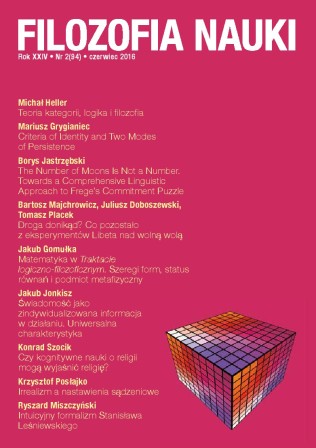Matematyka w Traktacie logiczno-filozoficznym.
Mathematics in the Tractatus.
Formal Series, the Status of Equations, and the Metaphysical Subject
Author(s): Jakub GomułkaSubject(s): Philosophy, Contemporary Philosophy, Analytic Philosophy, Philosophy of Science
Published by: Uniwersytet Warszawski - Wydział Filozofii i Socjologii, Instytut Filozofii
Keywords: philosophy of mathematics; formal series; symbolism; Ludwig Wittgenstein
Summary/Abstract: Philosophy of mathematics is not the most highlighted theme of the Tractatus logico-philosophicus: it is considered in no more than 21 out of over 500 theses of the book. However, a careful analysis of Wittgenstein’s understanding of mathematical concepts may be helpful in overcoming the two greatest interpretative troubles of the Tractatus: its apparent self-refutation and the mystery of metaphysical subjectivity. The core issue of the Tractarian philosophy of mathematics is the peculiar status of equations: Wittgenstein counts them as nonsensical pseudo-propositions (Scheinsätze) and yet he admits their usefulness in our calculations. The main goal of the present paper is to show how we can make sense of the Tractarian idea of equations as both nonsensical and useful. It is demonstrated that their status is similar to the status of the theses of the Tractatus – which are also nonsensical (according to 6.54) and useful for a certain purpose. The overall perspective on the self-refutation problem applied in the paper dovetails with the views recently advocated by Daniel Hutto and Marie McGinn. The problem of equations is also tangled with the problem of the nonpsychological I (mentioned in 5.641). As it was pointed out by Pasqualle Frascolla, there are two kinds of subjects mentioned in the Tractatus: the metaphysical subject – the limit of the world – and empirical subjects. The former is able to see immediately all the formal relations within the symbolism while the latter – i.e. us, humans – usually need logical and mathematical demonstrations, and this is why we must apply equations. However, it is indicated that Frascolla’s claim that the metaphysical subject is God is unreliable. It is much more natural to understand the nonpsychological I as the inner pole of the symbolism.
Journal: Filozofia Nauki
- Issue Year: 24/2016
- Issue No: 2 (94)
- Page Range: 77-93
- Page Count: 17
- Language: Polish

